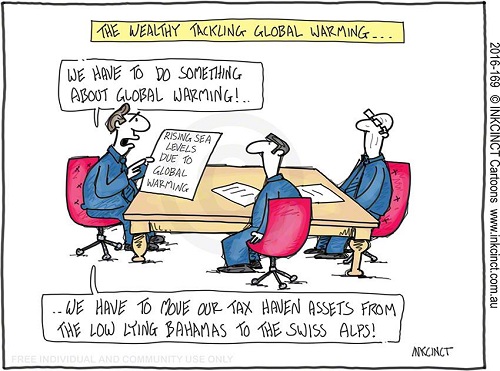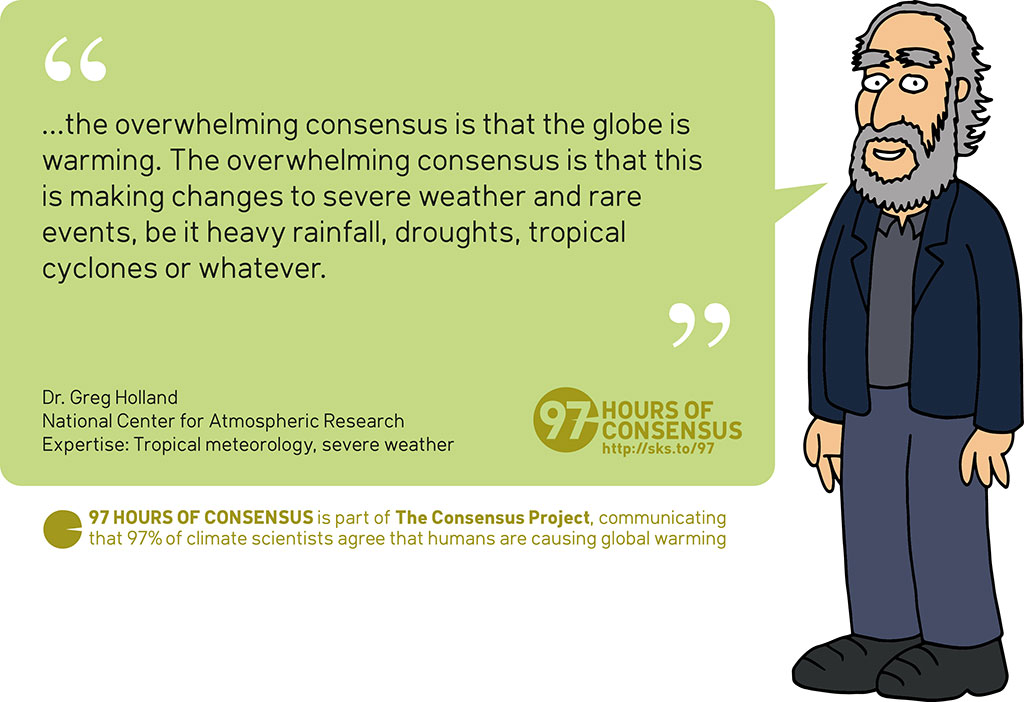
SkS Highlights... Toon of the Week... Quote of the Week... He Said What?... SkS Spotlights... Coming Soon on SkS... Poster of the Week... SkS Week in Review... 97 Hours of Consensus...
Using the metric of number of comments garnered, the two most popular articles posted on SkS during the past week were:

Every week, there are many new scientific studies published relating to climate change. It is a big field, a multidisciplinary field and a hot field.
But according to leading climate scientist Veerabhadran Ramanathan — credited with discovering that chlorofluorocarbons, or CFCs, are actually a greenhouse gas, among other major findings — a new study this week showing that clouds already are shifting their distributions across the Earth, and in a way predicted by climate change models, stands out. And not in a good way.
The study was led by Ramanathan’s Scripps Institution of Oceanography colleague Joel Norris, though Ramanathan said he was not involved in the work and didn’t know about it until shortly before publication. But Ramanathan said that the study basically confirms that there’s nothing to prevent the world from reaching the high levels of warming that have long been feared — except for our own swift policy actions, that is.
“My reaction was, my goodness,” Ramanathan said. “Maybe the 4 to 5 degree warming, certainly we were all wishing there was some certainty that would make it go away. So I consider the findings of this paper, the data shows major reorganization of the cloud system.”
This matters because clouds are fundamental regulators of how much solar radiation makes it to the Earth’s surface (rather than being reflected back to space by white cloud tops), and how much infrared or “longwave” radiation escapes back to space once again.
‘The most singular of all the things that we have found': Clouds study alarms scientists by Chris Monney, Energy & Environment, Washington Post, July 14, 2016
Rep. Lamar Smith, chairman of the (US) House Science Committee, escalated his confrontation over the climate probes of ExxonMobil by issuing subpoenasto two state attorneys general and several nongovernmental advocacy groups on Wednesday.
Smith (R-Tex.) announced the action in a news conference on Capitol Hill, saying the attorneys general of New York and Massachusetts were trying to criminalize the opinions of people and companies who hold alternative views on climate science.
Smith, joined by four Republican colleagues, demanded documents related to their discussions and investigations of Exxon. He harshly condemned what he called an attempt to suffocate the First Amendments rights of academic institutions, scientists and companies engaged in climate research.
"It is regrettable that two state attorneys general and several organizations continue to threaten legitimate scientific debate about climate change," Smith said during the news conference.
"The attorneys general have appointed themselves to decide what is valid and invalid regarding climate change. Attorneys general are pursuing a political agenda at the expense of scientists' rights to free speech."
State Attorneys General Subpoenaed by Rep. Lamar Smith for Exxon Fraud Probe by David Hasemyer, InsideClimate News, July 13, 2016


Quote derived from:
"I think we definitely need to actually change our habits so that we can leave our children and our children's children with a better world to live in. But in the meantime, over the rest of my lifetime and indeed the rest of your lifetime and many other people, we are going to have to adapt, we're going to have to accept that it's not gonna be six days per summer of extreme temperatures, it may be 20 days per summer of extreme temperatures and we have to take the appropriate actions to actually live with those conditions.
...the overwhelming consensus is that the globe is warming. The overwhelming consensus is that this is making changes to severe weather and rare events, be it heavy rainfall, droughts, tropical cyclones or whatever."
Posted by John Hartz on Sunday, 17 July, 2016
 |
The Skeptical Science website by Skeptical Science is licensed under a Creative Commons Attribution 3.0 Unported License. |